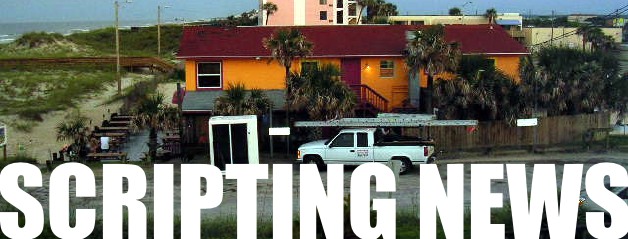
|
||||||||||||||||||||||||||||||||||||||||||||||||||||||||||||||
How to edit an outline for the podcast directory.
Robert Safuto is tracking all the OPML files that are announced on the podcast-directory mail list. Think of this as a staging area inside the staging area, a place where we get to see how things are shaping up before deciding on new categories. There's nothing more disappointing than a section of an outline with a single sub-head. I haven't written about Jay Rosen's announcement because I don't know what to make of it. I've read his description, and writeups by lots of senior bloggers. His project is an idea, it's still got to boot up, and I'm not sure how that happens. Of course because it's Jay Rosen, who I admire (and I'm hardly alone in that) I'll watch, with careful attention. Buried in Jeff Jarvis's writeup is a description of a startup called Daylife. As far as I know this is the first public description of the service, which I saw in April when I visited NY. I liked it so much I bought some stock. Keep your eye out for the official launch. SF Chronicle: "Fog rolled into the Northern California coast Monday afternoon, the first sign of a gradual cooling that will bring temperatures back to normal within a few days." I've discovered lots of new podcasts in the last few days, but two really stand out. 1. Times Talks is a series of hour-plus long interviews, a lot like the public symposia at Harvard, or meetings of the Commonwealth Club in the Bay Area. So far I've listened to two authors interviewed about a book on how we went to war in Iraq, and an interview with science fiction author William Gibson. I like the long form podcasts because I listen on my daily walk. It gives my mind something interesting to process while my body is getting some exercise. 2. CNN Long Form Programming is a series of interviews with CNN reporters, each lasting about a half hour, explaining their assignment -- what it's really like there. Very different from the superficial stuff we get in their TV reports. So far I've listened to reporters talk about Iran and Iraq. I learned more in these reports than I have in a year of trying to watch Anderson Cooper and Larry King. The podcasts are intelligent people talking to intelligent people about things that are really important. Unlike the dumbed-down crap we get in the official channels. One imagines the CNN reporters look forward to these podcasts because they rarely get to do "long tail" like story telling, which is probably why they got into journalism in the first place. Dead 2.0 asks his mom (she's smart about technology) to tell him what RSS is. At first she can't explain it, so she looks it up on Google, and is no wiser. Me, I'm glad we're talking about this. When you look at the results of the Google search, it's angry geeks complaining about RSS and saying they know the better way to do it. It's as if the "What is a car?" page was a battleground between people who prefer wanker engines over internal combustion engines. To most people a car is something you use to drive places.
I could write about this (and have), but it would be widely flamed about, by the same people who control the conversation on Google. Bonus link: Jo Twist wrote an excellent What Is RSS piece for the BBC. Rex Hammock has a better search term for getting useful info about RSS.
|
Comment on today's
|
|||||||||||||||||||||||||||||||||||||||||||||||||||||||||||||
|
© Copyright 1997-2006 Dave Winer. Previous/Next |
||||||||||||||||||||||||||||||||||||||||||||||||||||||||||||||


 When people ask me what RSS is good for, I start with "automated web surfing." It gets you more news for the time you put into using the Internet. If you don't want more news then RSS is probably not for you. But if there are subjects that you are intensely interested in, and if the people covering the topics also offer the information in RSS, then your computer (or a web site) can make web surfing a richer and perhaps more productive experience.
When people ask me what RSS is good for, I start with "automated web surfing." It gets you more news for the time you put into using the Internet. If you don't want more news then RSS is probably not for you. But if there are subjects that you are intensely interested in, and if the people covering the topics also offer the information in RSS, then your computer (or a web site) can make web surfing a richer and perhaps more productive experience.


